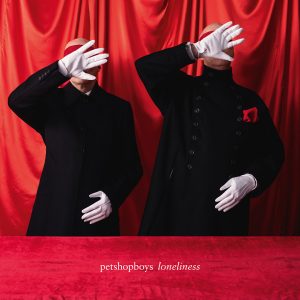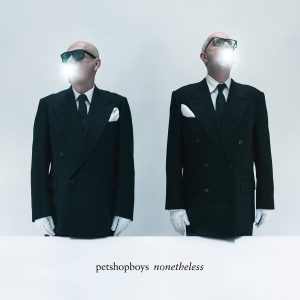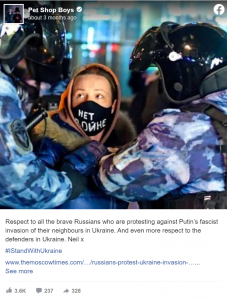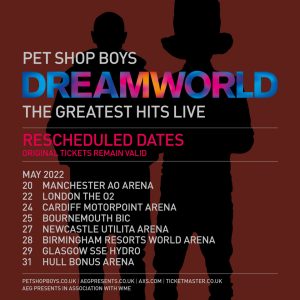IN APRIL 1984, the Pet Shop Boys released their first single on Bobby O’s Bobcat record label, and the soundtrack to life in the gay Eighties changed course and speed. The original version of ‘West End Girls’ was a club hit on the American West Coast, and a minor success in France and Belgium. Re-recorded just over a year later, with Stephen Hague at the control desk, by early 1986 it had made number one in Britain and eight other countries worldwide. The Pet Shop Boys had arrived. Although their working relationship with Bobby O was short-lived (ending somewhat disagreeably in March 1985 with the latter relinquishing all contractual rights in return for a substantial royalty return on future record sales), linking up with the legendary New York producer was a determining moment in the careers of Neil Tennant and Chris Lowe. Largely responsible for the Hi-NRG successes of club acts like Divine and Man 2 Man, Bobby O helped define the sound of early Eighties gay disco. Having fulfilled their dreams of being part of the Bobby O story, the Pet Shop Boys turned the sound around, slowed it down, speeded it up again, and made it into something new, without ever fully divorcing it from its generic roots. They also did something unthinkable: they wedded the euphoric sound of gay disco to lyrics which sounded very serious. Before the Pet Shop Boys, disco records were noted for the vacuity of their lyrics. In many instances, the words provided little more than verbal echoes to the all-important beat. The Pet Shop Boys were keen on the beat too, but they weren’t prepared to surrender everything to it. Even now, it is hard to imagine Neil Tennant every completely surrendering himself to a typical disco lyric like, ‘Oooh, love to love you baby’. For one thing, it’s too passionate. The Pet Shop Boys may have made records that Spike about passion (‘I don’t like much really, do I?’ Chris Lowe deadpanned on ‘Paninaro’. ‘But what I do like, I love passionately.’), but they have never been especially good at expressing it through song. And of course the other point to make about a lyric like ‘Oooh, love to love you baby’, the other thing that makes it not very Pet Shop Boys, is that frankly, it is just too obvious. ‘Obvious’ is not a word one would normally associate with Tennant and Lowe. In spite of Neil Tennant’s famous assertion that their music was a marriage between Hi-NRG and ‘traditional songwriting, where the lyrics are interesting and make some kind of personal statement’, the ‘statement’ part has never been very explicit. The truly ‘ironic’ thing about the Pet Shop Boys is that they have somehow managed to spin a career around the fears, the frustrations and (just occasionally) the fun of being young(ish), gifted and gay without being drawn into discussions about that all-important, always absent ‘G’ word. ‘Obviously, people are going to look at our songs and read things into them,’ Neil said once. Obviously, but he also maintained that he and Chris were ‘completely misunderstood anyway.’ Refusing to clarify the situation, he kept stressing that there was a difference between what he and his musical partner might do in private, and what they were prepared to say in public. ‘We’ve never said anything about our sex lives to the newspapers or to magazines,’ he told the NME in 1986. ‘And we don’t intend to.’ AND THEY HAVEN’T. Until today, that is. Today, Neil Tennant has Something to Tell Me. Or at least that’s what I’ve been led to believe. The word on the gay grapevine is that the vocal half of the Pet Shop Boys has decided to speak out about his private affairs, so naturally I’ve been pushing for an opportunity to allow him to do just that. The only problem is, in all the discussions we’ve had setting up this interview, nobody has actually raised the subject. Not me. Not my editor. Not even the Pet Shop Boys’ press officer, who suggested that he and I meet twenty minutes before Neil arrived. I was anticipating some kind of prep talk, something along the lines of: ‘Look, Neil has decided to do this interview after a lot of careful thought, so please respect his feelings and please, ‘please’ be gently with him.’ Instead, we had a friendly chat about life and the media in general and nothing very much in particular. So here we are then, Neil Tennant and I, forty-five minutes into our agreed two-hour session, and still I haven’t popped the question. Instead, we’ve discussed a lot of other, more public things, like why the Pet Shop Boys decided to do a charity record. ‘We didn’t actually decided to do a charity record as such,’ Neil informed me, a little crisply. ‘We just had the idea of doing ‘Absolutely Fabulous’ because both Chris and I love the programme, and we decided to do it for Comic Relief as a way of dealing with it, really. That way, we knew we wouldn’t have any trouble getting the samples cleared by the BBC.’ We’ve talked about the Pet Shop Boy’s contribution to the forthcoming Kylie Minogue album. ‘Oh yes, the legendary Kylie album. Well, we always had to work with Kylie, of course, because she’s such a trademark: Kylie! She’s made it, really. She’s just one name. We were asked if we’d like to work with her last year, but we’d just finished our last album and couldn’t really be bothered to do any more. Then we wrote this song, and I said to Chris, ‘Oh, we should give this one to Kylie’. I thought it sounded like Stock-Aitken-Waterman Kylie, which is exactly what she’s trying not to do, unfortunately. but we sent it to the record company anyway, and they liked it, and she liked it. They’ve made it very different to the way we wrote it. It doesn’t really have the same tune in it, for instance, and they haven’t put the chorus in, but I suppose that’s very modern.’ Largely thanks to the fact that Kylie is such a modern girl, Neil and I have sailed close to the wind a few times. We’ve talked about Kylie’s gay audience, for instance, and the difficulty of broadening one’s appeal without alienating one’s core audience. ‘I think it must be quite difficult being Kylie,’ Neil remarked at one point, to which my natural response was: and is it difficult being Neil Tennant? ‘In what sense?’ was his guarded reply. In the sense of being misunderstood. ‘Sometimes, though I’m learning not to care about it. It is obviously a failure of ours, that we have given people the impression that what we do is some kind of elaborate joke.’ So having established that it is obviously a failure of mine not to have given Neil Tennant the opportunity to clear up any lingering doubts anyone might have about whether he is or is not gay, I go off into a very long, elaborate question about his impression of how the Pet Shop Boys are seen by the gay press, my impression of how their first album, ‘Please’, seemed to share a lot of common ground with Bronski Beat’s ‘Smalltown Boy’, and how he felt about Jimmy Somerville’s much-publicised accusation that he and Chris Lowe were exploiting gay culture for career purposes, and to putting anything back. Neil Tennant draws a deep breath. ‘The thing is,’ he says, rearranging himself on the sofa, ‘we were kind of stitched up by the NME on that one. They did an interview with us, and then they went on and on about hamsters. They never actually asked us, ‘are you gay?’ And then Jimmy Somerville was quoted everywhere, slagging us off. I thought it was quite arrogant of him, actually. He obviously thought that he had a right to talk about us in that way, and that his views on the subject were more important than our own views. His view is that the entire point of being a pop star is to be a positive role model. I reject any notion of being a positive role model to anyone. I personally find that an arrogant way to think of oneself…’ He pauses for a moment, realising perhaps that this line of arguement is only likely to open old wounds. ‘When Bronski Beat came along, I was still assistant editor at ‘Smash Hits’. I loved those first few records. I loved the fact that they were gay, ant that they wee so out about it. It was the whole point of what they were doing. Jimmy Somerville was, in effect, a politician using the medium of pop music to put hi message across. The Pet Shop Boys came along to make fabulous records. We didn’t come along to be politicians, or to be positive role models. Having said all that, we have supported the fight for gay rights.’ He reminds me at this point that the Pet Shop Boys were the only pop group to play ‘Before The Act’, a benefit for the fight against Clause 28. ‘And what’s more,’ he goes on, ‘I do think that we have contributed, through our music and also through our videos and the general way we’ve presented things, rather a lot to what you might call ‘gay culture’. I could spend several pages discussing the notion of ‘gay culture’, but for the sake of argument, I would just say that we have contributed a lot. And the simple reason for this is that I Have written songs from my own point of view…’ He pauses again. ‘What I’m actually saying is, I am gay, and I have written songs from that point of view. So, I mean, I’m being surprisingly honest with you here, but those are the facts of the matter.’ Having finally got all that off his chest, Neil Tennant pours himself a glass of mineral water and takes his sweatshirt off. He is looking distinctly pink around the gills. Maybe it’s the effect of suddenly admitting that for all these years he has been singing nothing but the truth. Or maybe it’s just the unbearable heat in here. ‘Well,’ he says, in a voice which carries a distinct sense of ‘moving swiftly on’, ‘what’s your next question?’ THE QUESTION EVERYBODY always asks about the Pet Shop Boys is, are the ‘serious’? And what they usually mean by that is, can such obvious displays of camp irony ever be regarded as remotely sincere? ‘Yes,’ is Neil Tennant’s immediate response, though of course it isn’t nearly as simple as that. ‘A lot of people seem to think that I’m not committed to what I’m singing about,’ he says, mournfully. ‘It’s partly because of the way I sing, I suppose. It gives everything a kind of distance. This isn’t true for me personally. Personally, I think my voice is full of expression. At least that’ how I hear it. But I know other people hear it as this cool, detached voice, and so they assume it’s meant to be ironic. But it’s just the style of singing I like, and also it’s all I can do. I can’t sing like Jocelyn Brown. Someone asked me once why people like me and Bernard Sumner sang in this way, why we didn’t put more vocal acrobatics into it. I said, ‘Well, it’s because we’re not good enough. We can’t, I’m afraid. I’d love to be able to, but I just can’t.’ But also it’s the limits to your ability that create your style, ultimately. In pop music, style tends to e determined by what you can’t do. That’s why limitations are so important, and why pop music presents such a problem to consummate musicians. They don’t have a style, because they don’t have limitations. And so they end up playing jazz.’ Neil Tennant’s fervent defense of pop music is well documented, as is his tendency to get defensive at the suggestion that what he regards as an expression of deep feeling might be construed by other people to be an exercise in camp excess. ‘I never really think of us as being camp, typically,’ he says. ‘But I suppose the idea of the Pet Shop Boys recording with Liza Minnelli is camp in itself. We occasionally do very dramatic things, like the start to ‘Left to My Own Devices’, which is quite camp I suppose. But I think people use the term ‘camp’ in the wrong way a lot of the time. The Liza album is not ‘arch’. It’s a totally sincere record. Camp is naive. True camp has a totally one hundred percent belief in itself. The thing about somebody like Liza is that she is very naive as a performer. She’s just like that. The intention is never to be camp. The intention is to make something beautiful and exciting, something that will have the effect of lifting you away from your surroundings.’ NEIL TENNANT WAS born and bred in Newcastle. Although he has been known to speak fondly of his roots (‘Chris and I are very proud of our Northerness,’ he told a journalist a couple of years ago), he has also rubbished the notion that a sense of where you come from carries any real sense of belonging. (‘I’ve never really admired regionalism,’ he said in the same interview. ‘I’ve never admired tribal loyalties.’) His parents brought him up a Catholic and, from the age of eleven, he attended school at St. Cuthbert’s Catholic Grammar. Years later, he summed up his feelings about his school years on a song entitled ‘This Must be the Place I’ve Waited Years to Leave.’ ‘It was the petty discipline. And it was a very sporty school. I definitely hated that part of it. But it made me what I am, really. It made me think, ‘Well, you’re all going to have boring middle-class lives and I’m going to be a superstar!’ In a way, it made me realise what I definitely ‘didn’t’ want to be.’ His feelings about Catholicism, on the other hand, were never so clear cut. ‘When I was a boy, I always wanted to be a priest. Being me of course, I wanted to be the pope. I thought, if you’re going to go in for all of that, you may as well be at the top, you might as well be number one. My parents insisted that I go to school, and that if I still wanted to be a priest at the end of it, then that would be OK with them. And of course by the time I was eighteen I didn’t want to be a priest anymore. I stopped believing in all that when I was about sixteen. I think you do at that age. It’s a contest between religion and sex. The church tells you that masturbation is wrong. And of course you can’t not masturbate at that age, so you have to make a choice between that and religion. Religion invariably loses out.’ By the time he’d reached the sixth form, the wanking, would-be superstar had lost interest in school and taken to hanging around town with a few sympathetically-minded friends. It was round about this time that he first began fantasising about running away to London. ‘I used to go and watch the trains puling out of Newcastle Central Station at 11 o’clock on a Saturday night, and I used to think about how I could just get on a train and be in London in four-and-a-half hours. It all sounds fantastically romantic, I know. But I had a very escapist view of things at the time. In some senses I still do. I still run away quite a lot, really.’ He finally made it to the capital in 1972. He studied history at North London Polytechnic, and worked at the British Museum to pay his way in the holidays. ‘I still remember going to the interview,’ he says, laughing. ‘I had to climb up this spiral staircase, and I was wearing women’s wedge shoes with four-inch heels. I could barely walk. I had my hair cut short and dyed bright red. I got the job anyway. For some reason they quite like me. The British Museum is a very strange place. There’s a lot goes on behind the book shelves there.’ Graduating with a 2.1, he immediately got a job as the London editor of ‘Marvel Comics’, where his first assignment was to interview Marc Bolan. ‘After that, I worked in book publishing for a few years, then I joined ‘Smash Hits’, and then it was the Pet Shop Boys. So I suppose you could say that I was never being boring. Neil Tennant has a habit of doing this, of working snatches of his song lyrics into the conversation. In the course of our interview he managed to quote, at considerable length, the words to at least half a dozen of the songs I made specific reference to. Perhaps this is a sign of a complete lack of assumption: he really didn’t expect me to be familiar with them. Or perhaps, in spite of how he once insisted that he was anything but a clever pop strategist, he can’t resist an opportunity to show the world just how clever he really is. ‘Actually, my favourite lyrics aren’t the ones that sound clever,’ he says, setting me straight. ‘They’re the ones where you manage to get over what you’re saying in words so simple that people don’t really notice them.’ IT WAS WHILE we were on the subject of his education that Neil Tennant said the most extraordinary thing. Remembering how he was once hauled before the headmaster to account for his bad attendance record, he gazed into the distance and said: ‘He called me into his office one day and said to me, ‘Let’s face it, Tennant, you’re soft, aren’t you? You don’t like school discipline.’ I just said, ‘Yes Father, no Father.’ And I thought, ‘What do you mean by that?’ Of course I knew exactly what he meant by that. I was a classic poof even then, I suppose.’ He pronounced this last sentence with such an air of casual indifference, I forgot for a moment that this was Neil Tennant I was talking to. Neil Tennant, who once told a prying journalist that how he defined himself sexually didn’t matter, ‘only the songs’ mattered. Neil Tennant, whose favourite way of dealing with the fact of his homosexuality in his songs has been to reduce it to nuance and connotation. Neil Tennant, who writes lyrics in which the romance of homosexual longing is weighed up against the shame of homosexual wrongdoing (‘It’s a… it’s a… it’s a… it’s a sin!’). Neil Tennant, who having taken all these years to publicly come out and talk about what he does in private, confesses that he still isn’t really sure whether he wants to be known publicly as ‘a classic poof’, whether indeed he wants to be known publicly as anything. ‘I knew a lot of gay people when I was growing up in Newcastle,’ he tells me when I push for a bit of sexual history. ‘It was the early Seventies, and it was all divinely decadent darling, y’know, with David Bowie being all androgynous, and ‘Cabaret’ and stuff. I went out with girls at that time, and I sort of didn’t want to be gay in a way. I didn’t really like what I saw of the gay way of life, and I certainly didn’t want to be a part of it. Then in the Eighties I realised that I probably was gay. I mean, by then I knew what I was attracted to. But I didn’t really have a proper affair with anyone until three of four years ago, really. For most of the Eighties I was, well, not exactly celibate, but not far from it.’ Even today, he says, he would hate anyone to suggest that his identity was determined by his sexuality. ‘I’ve never wanted to be a part of this separate gay world. I know a lot of people will not appreciate hearing me say that. But when people talk about the gay community in London, for instance, what do they really mean by that? There is a community of interests, particularly around the health issue, but beyond that what is there, really? There’s nightclubs, music, drugs, shopping, PAs by Bad Boys Inc. Well I’m worry, but that really isn’t how I define myself. I don’t want to belong to some narrow group or ghetto. And I think, if they’re really honest, a lot of gay people would say they felt like that as well.’ It suddenly strikes me, after all this talk about defining yourself by what you don’t want to be, about running away, about wrestling with a sense of belonging, that this – the gay community – must be the place Neil Tennant waited years to arrive at. Only then did he discover that he really wanted to leave, but to his intense frustration he couldn’t, that other people wouldn’t allow him to. ‘I’ve always maintained that there was something worthwhile about my decision to make my lyrics generally applicable,’ he protests at one point. Then he adds, almost as if he was thinking aloud, ‘If I was arguing with me now, I’d probably say ‘That’s a complete cop-out, Neil’.’ That’s a complete cop-out, Neil ‘Yes, I suppose it is,’ he says glumly. ‘But it sort of comes across anyway, doesn’t it?’ LIKE MANY PEOPLE, I first came across the Pet Shop Boys in 1986. I was at Heaven, watching a boy in a tight white vest dancing to ‘Opportunities’. He wasn’t being ironic. And neither, at the time, were the Boys. I’ve always thought that there was something vaguely sexual about that song. In the video, Neil, dressed like a proper toff, hangs around a garage, trying to solicit a response form a very sullen Chris Lowe: ‘I’ve got the brains, you’ve got the looks, let’s make lots of money.’ Basically, it’s a song about pulling a fast one, and there has always been more than one way of interpreting that. And then there are the slow songs, the songs to make you cry, the songs about going out, looking for love and finding disappointment. ‘That boy never cast a look in your direction,’ Neil laments on ‘Later Tonight’. I think what he really meant to say was, ‘That boy never cast a look in ‘my’ direction.’ But never mind. As he says, it sort to comes across anyway. It comes across in later lyrics, too. ‘I love you, you pay my rent’, ‘your life’s a mystery, mine is an open book’, ‘left to my own devices, I probably would’. Regardless of whether they intended it be read that way, the Pet Shop Boys have effectively set the pace of gay urban life ‘to a disco beat’, whilst staying in tune with the shifting moods of the times. If ‘Please’ was about wanting a lover and going out late, ‘Actually’ was about waking up and going out shopping, and ‘Introspective’ was about wanting a dog and feeling, well, introspective. By the time the Eighties ended with ‘Behaviour’, Tennant and Lowe were writing songs about staying in, giving up smoking (‘cos it’s fatal’), and coping with the pressures of monogamy. And the pressures of loss. The Pet Shop Boys arrived at precisely that moment when AIDS began making headlines in Britain. A year later, Neil Tennant’s closest friend confided that he had recently been diagnosed as having AIDS. they’d known each other since they were fifteen. ‘It all came as rather a shock to me at the time,’ Neil recalls. ‘In 1986, it was still very shocking to know someone who had AIDS.’ He registered his feelings on a song from ‘Actually’, entitled ‘It Couldn’t Happen Here’, and for the next three years made regular visits to St. Mary’s hospital. When his friend died in 1986, he wrote a song about going to the funeral. ‘Your Funny Uncle’ describes the tensions that arise when a gay man’s family and friends meet for the first time in order to pay their last respects. It was the flipside to ‘It’s Alright’, a cover of a Sterling Void song, the lyric of which insists that everything is going to be alright, for the simple reason that ‘the music plays forever’. Actually, this isn’t nearly as flip as it sounds. In 1987, on a track called ‘Hit Music’, Tennant had wondered aloud about the changing function of music in a world with AIDS. ‘It’s a song about what happens when you take the sex out of dance music,’ he explains. ‘What does music become then/ It becomes a sort of insulator, a form of protection, of comfort.’ Lest anyone conclude that he was being far too glib about all of this, the repressed anxieties surfaced a year later on ‘Domino Dancing’, where he sang about dancing with danger, adding another number to the score and watching ‘them all fall down’. HAVING SURVIVED ALMOST a decade of minding their language and feeling gloomy, the Pet Shop Boys ended 1993 with what many people, me included, consider their most obviously gay musical statement yet. Neil Tennant refutes my suggestion that ‘Very’ marks a departure from previous albums, that it is, in effect, the Pet Shop Boys’ coming out album. ‘What you have to remember,’ he says patiently, ‘is that all of our albums contain songs written over a period of twelve years. ‘To Speak is a Sin,’ which is on this album, was actually written in 1983. If there is a difference between this album and the albums before, it’s simply that ‘Very’ was written from the point of view of me being in love. It’s a diary of a relationship. But that is really the only difference to speak of. There’s a song on the last album, called ‘Nervously’, which I wrote in 1981, before I’d even met Chris Lowe. It’s about two people – sorry, two boys, or two men or whatever – meeting for the first time. And some of the songs on ‘Please’ are as gay as anything we’ve done since. So I don’t think it’s entirely true to say there has been a radical progression in those terms.’ Perhaps not, but the decision to record a particular song at a particular time must count for something – it is at that moment, after all, that what was once a private thought becomes a public expression. And whereas the discreet coding of previous albums might have allowed straight listeners to avoid the point and accuse others of ‘reading things in’, only a complete and utter moron could fail to follow the plot of ‘Very’. Anybody who listens to Neil Tennant singing about dancing to disco, taking all of his clothes off, finding liberation in love, dreaming of the queen, waking from an AIDS-soaked nightmare and finally deciding to go west, and then arrives at the conclusion that this is ‘not’ an album about what is means to be gay in the 1990s is quite clearly ‘reading things out’. I’VE HAD THIS great idea for a title for the next Pet Shop Boys album. I think they should call it ‘Honestly’. I think ‘honestly’ is a very Pet Shop Boys word. Like ‘Please’, ‘Actually’, ‘Behaviour’ and ‘Very’, it is very serviceable in as much as it manages to convey a variety of meanings all at once. ‘Honestly’ as in ‘sincerely’. ‘Honestly!’ as in ‘I can’t believe you just said that!’ ‘Honestly?’ as in ‘I don’t believe you for a moment.’ in fact, it could be the title of the album the Pet Shop Boys never quite got around to recording, but very nearly did. I am about to suggest this to Neil Tennant when suddenly, he decided to introduce me to another word in the Pet Shop Boys’ vocabulary. ‘There’s a song on the b-side of ‘Go West’ called ‘Shameless’, he tells me as he polishes off the last of the Evian. ‘The lyric goes, ‘We’re shameless and we’ll do anything for our fifteen minutes of fame, we have no integrity, we’re ready to crawl, to obtain celebrity we’ll do anything at all’. The song is an anthem to shamelessness, ‘shameless’ being one of my favourite words anyway. I think you have to be shameless to be in pop music. You have to have some element of shamelessness about you, otherwise you simply couldn’t do it. You’d be to embarrassed. For me, being in the Pet Shop Boys has always been a struggle between total embarrassment and total shamelessness.’ Listening to the tape of our conversation few days later I begin to wonder what the point of this strange confession was. Perhaps it was a reference to Neil Tennant no longer feeling any sense of embarrassment about who he is, that his decision to go public about his private affairs means he has reached that point where he no longer looks back on his life ‘forever with a sense of shame’. Or perhaps I’m reading too much into this. Perhaps it was simply his way of reminding me that he wouldn’t normally do this kind of thing. Honestly.
Taken from: Attitude
Interviewer: Paul Burston





